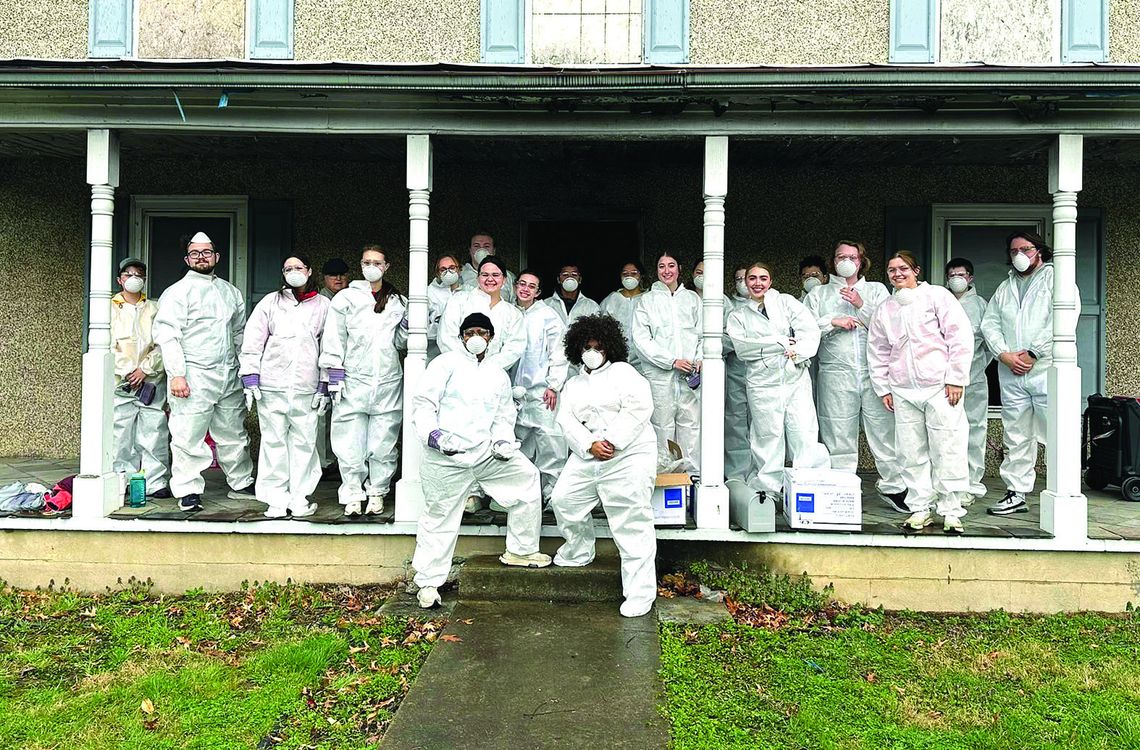Editor’s note: The following feature was written by Lori Turner, executive director of the Community Foundation for Rockbridge, Bath and Alleghany.
“As I sit here today writing this, I cannot help but to reminisce about where I was. I was struggling with a lost and confused mind, addiction, support, and at times wondering if this place would just be better off without me.” - Bobby Slagle With a pure heart but actions that stated otherwise, Bobby began his journey on a different road. After 30 years of addiction, 15 of those years spent in institutions, prisons and jails, he found himself at the lowest point he could be. He attempted suicide, which was the moment that changed his life forever. At that point, he came to realize that with his life experience, he could help someone just like him. This is his story of hope, faith, and love.
Bobby woke up in the hospital, n ot r ealizing h e h ad b een in a coma for eight days. He looked around and saw all the wires attached to his body and struggled to remember how he got there. He later found out that his body had detoxed while he was unconscious. The doctor shared how he had experienced traumatic seizures, profuse sweating, increased blood pressure and heart rates. This had taken an incredible toll on his body, and it was a miracle that he had survived.
He had hurt everyone who loved him. The amount of disappointment he had in himself was almost unbearable. The months ahead were filled with anxiety, depression, lack of sleep and everyday struggles to get back on his feet and begin the journey ahead. He spent several months isolating himself, away from everyone and everything. This was a necessary process for him to find peace and to move forward. He used this as a time with God to heal and prepare for the foundation that was being laid out for him.
Rockbridge Recovery is now his full-time mission. This organization is working hard to leverage community partnerships to allow them to serve those in need. Their approach is not only to bring awareness to the community of the struggles in addiction but also to reassure those out there struggling with addiction that they are not alone in fighting to overcome this destructive disease.
Rockbridge Recovery Center is a 501(c)(3) not-for-profit organization established to assist those struggling with substance abuse and addiction during the recovery and rehabilitation process, and to provide mental health support to those who suffer from illness. It is governed by a board that consists of six individuals, including two retired counselors. In 2022, volunteers donated 1,624 hours to the mission - which included 1,200 hours dedicated to group and private sessions and to ensuring the center was open for those in need.
After opening in July of 2022 in a house in Buena Vista donated by Pastor Mike Hamilton of the First Brethren Church, the center served 108 individuals and/or families from July to December. The organization aims to double the number served in 2023. It has assisted 35 individuals/ families though their donation closet, five of which were homeless individuals, and five transient individuals since inception. It has assisted 38 clients with addiction support groups, classes and private sessions, 42% of whom still participating regularly. Additionally, monthly their Care Kit Program helps an average of 25 individuals/families.
The Rockbridge Recovery Center hosts evening groups, classes, and meetings to support the Hope House clients in their recovery process.
More recently, the center received a donation of a house and property on Magnolia Avenue which will be renovated into the separate Hope House, with a target date of opening next January. Many of the clients they are aiding in rehabilitation programs are jobless and homeless when they graduate from the program. The Hope House will provide a place for them to go as they progress towards independent living. However, the house is in dire need of repairs to be livable.
The Community Foundation for Rockbridge, Bath and Alleghany (CFRBA) has launched a collaborative funding project which is committed to paying for the renovation of Hope House. The CFRBA will have fiscal oversight for the Hope House project and has formed a coalition of community funders to pay for the complete renovation of the house.
The Community Foundation is always looking for projects which address the most critical needs in the area. Currently, the drug epidemic is a top priority. The Foundation did not want to be redundant to services already being offered by other agencies, so the focus is on sober living homes, given that three are none in the region.
This renovation project is being supported in big ways by the community. Spencer Home Center and Rockbridge Flooring are two key partners, supplying materials and labor. Matt Welsh of Welsh Construction is also a major player, serving as the general contractor on a volunteer basis.
All the contractors working on the house have agreed to donate the labor for their services. This includes Higgins Construction, Colin Richardson Electrical, KC Custom Tile, Natural Bridge Heating and Air, and Pioneer Plumbing.
Several local funders have supplemented the Community Foundation’s internal efforts and have raised the first $65,000 for the project. Contributors include the estate of the late Buddy Derrick Jr., the Rockbridge Community Health Foundation, Grace Episcopal Church, Feed the Need Foundation, Lexington Presbyterian Church, and Rockbridge Church.
The project is also being supported by several partners offering a variety of services, including food assistance, health and wellness services, legal services, financial classes, warm meals, and daily essentials to the residents. These partners include Rockbridge Area Relief Association, Bridge to Hope Food Pantry, Rockbridge Area YMCA, United Way of Rockbridge, Lexington Rockbridge Chamber of Commerce, Rockbridge Area Habitat and CARE Kits Program.
About Sober Living Homes Transitional sober living houses help individuals transition between drug rehab and their new drug-free life through supportive drug-free housing, career development programs, life skills courses, and the guidance and support they need to succeed. Many individuals attempting to abstain from alcohol and drugs do not have access to proper housing that supports sustained recovery. Residents live with other like-minded individuals committed to recovery, who help keep them accountable in their own journey.
Residents will receive assistance, which may include such things as obtaining a driver’s license, a GED, or child visitation rights. Each resident will have specific needs and a customized plan to follow. Residents will participate in recreational programs such as basketball, kayaking, fishing, and hiking. They will be provided with transportation to community service obligations, court hearings, probation requirements, and required treatment meetings and prevention education classes.
Sober living homes are a realistic, cost-effective living environment for people in recovery. Studies indicate that living in sober homes after inpatient treatment increases recovery rates, financial strength, and overall stability. A study published in the Journal of Substance Abuse Treatment found sober living home residents experienced improvements in arrest rates (49% reduction), alcohol and drug use rates (50% reduction), and employment rates (40% increase in wage over nonresident).
Targeted beneficiaries include any area resident from our region who have completed a drug rehabilitation program. There will be an application form for acceptance that will need to be completed and reviewed by the Hope House advisory committee. The house is expected to house six clients at a time for up to six months. They plan to always have one bed available for a 24-to-48-hour pass where local law enforcement or hospitals can send a client who has been released with an acceptance letter to a rehabilitation program, but who cannot check in immediately. The staff would supply transportation from the releasing facility and to the accepting program.
The results of the local Community Health Needs Assessment, recently conducted by Carilion Rockbridge Community Hospital, indicated alcohol and drug use and mental health problems are two of the top three issues impacting the health of our community. These services were rated the most difficult health service to access, and a top need in the community.
Students from Washington and Lee University’s Nabors Service League and Carson-Newman University recently began aiding with the partial demolition of the Hope house structure. The house had suffered smoke damage throughout, requiring it to be taken down to the studs. Thirty volunteers, along with Rockbridge Recovery staff and community volunteers, have the house ready to begin renovation in June. This demolition was supported by sponsorships from C&S Disposal and Advanced Drainage Systems.
Why The Hope House
Hope House is Bobby’s way of giving back. Recovery is a lifelong journey. While getting sober may require a detox or rehab program, living sober requires constant commitment and care. For many, returning home after treatment jeopardizes that ability to truly live sober. If a person’s home life is filled with stresses or pressures, or if they are returning to the same habits they left from, it can significantly increase their risk of relapse.
At the Hope House, residents will be surrounded by people who support their recovery, and who will hold them accountable daily. House managers will be available 24/7 to help with any potential issues that arise in their recovery and are there to listen to as well as offer advice or suggestions for coping mechanisms. The house is connected to staff who have walked in similar shoes and are now peer recovery specialists.
The Hope House will be certified by the Virginia Association of Recovery Residences (VARR). The mission of VARR is to set prominent levels of standards for quality recovery residences in Virginia and to accredit residences that meet rigorous support standards and are bound by the core principles of standards, ethics and unity.
The project has received numerous letters of support from law enforcement and community leaders.
“Although our community has some resources for treatment, those resources are stretched thin,” said Josh Elrod, commonwealth’s attorney for Buena Vista. “Sober living houses are often a key part of a recovery journey for individuals with the most intractable addictions. I have experienced in my own the work the effectiveness of these types of facilities in recovery. I believe having a local community- based sober living house would be a significant benefit for our criminal justice system and for the community itself.”
The Community Foundation, in cooperation with the cities of Buena Vista and Lexington and Rockbridge County, have submitted a grant to the Opioid Abatement Authority for funding to financially sustain the operations of the Hope house for the first five years. At that point, the OAA grant could be awarded for up to an additional 18 years per opioid settlement guidelines. This is an example of what can be accomplished when the three localities in our region work together for a common cause.
“Renovating the house was just the beginning,” said Steve Grist, chairman-elect of CFRBA. “Financially sustaining the operations was made possible by those leading our communities who believed in the Community Foundation, understood the need for sober housing in the area and were willing to apply for the OAA funding on our behalf.”
The Community Foundation continues to seek renovation funding support. The project needs funding for unexpected issues that may arise once construction begins.
If you would like to support the Hope House project, please send contributions to the Community Foundation at P.O. Box 20, Lexington, VA 24450 or use the following giving link for donations: https://cfra.fcsuite.com/erp/donate/ create/fund?funit_id=1660.





